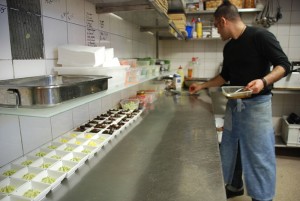Is what’s good for the countertop good for the cold-cuts? One might argue that eliminating bacteria present on food preparation or processing surfaces is of little value when the food itself is already contaminated with salmonella or E. coli. That very reasoning prompted PURE Sciences Inc. to develop a new, direct-to-food application for its liquid disinfectant called SDC (silver dihydrogen citrate).
Swift Acting, Long Lasting
For years, SDC has been used to wipe down contact surfaces in restaurants and factories – part of a well-established food safety certification protocol. CEO of PURE Sciences, Hank Lambert says they’ve produced new concentrations of the formula suited for direct contact with food. When tested on poultry, it killed all bacteria within 30 seconds, with residual protection for up to 24 hours.
The company is planning multiple uses for its formula, looking beyond meats to the sterilization of vegetables and fruits.Lambert believes that the SDC food wash takes “antimicrobial applications in the food industry to the next level,” effectively wiping out “the pathogens that are so persistent throughout the food industry.”
But what else might SDC wipe out?
Erasing Accountability for Meat Processers
Critics of PURE Sciences antimicrobial wash are concerned that that the option of “cleaning” meat at the end of the production line alleviates accountability for what happens earlier in processing. Four million Canadians get sick from contaminated food every year. Any student enrolled in a food safety course will confirm that meat recalls throughout Canada and the US are on the rise and pose a significant health risk. And that many of these cases begin with unsanitary living conditions for livestock – conditions that make animals sick and breed bacteria. Our ability to “wash” away the evidence of this poor management may shift critical attention away from an important root source of contamination.
Killing Valuable Bacteria in Humans?
The lack of clinical research on SDC is generating concern over its possible long-term health effects in humans. Although the antimicrobial wash is undergoing testing and will require FDA and USDA approval before its use on food, we simply don’t have data with which to predict health impacts down the road. PURE Sciences asserts its product is non-toxic to humans, but critics are unconvinced that SDC is discerning enough to eradicate only harmful pathogens in foods – and not the useful gut bacteria we need for digestion and to protect ourselves from infection.
Every human plays host to a pound or two of living bacteria. These microorganisms regulate everything from our brain chemistry to our body weight. If we consume anti-bacterial compounds as a precaution against food-borne illness, we may cause more problems than we solve.
Do you think an antimicrobial food wash is the ultimate answer to food borne illness, or merely a tempting – and profitable – quick-fix?




